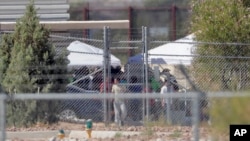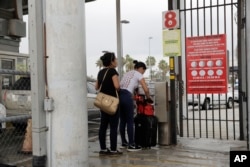U.S. President Donald Trump told federal agencies to reunite immigrant families separated after illegally crossing into the country from Mexico.
“We want to put them together,” Trump said during a Cabinet meeting Thursday while the first lady, Melania Trump, was visiting a detention center for migrant children in McAllen, Texas.
More than 2,000 children have been detained apart from their parents since April. Public outrage over images of young people sitting in cages and audio of wailing children broadcast globally in the past week prompted Trump to sign an executive order stopping the border separations of migrant children from adults.
But how officials will handle the immigrant legal cases remains unclear. A VOA reporter at an immigration court hearing in Brownsville, Texas, Thursday morning said prosecutors dropped misdemeanor charges against 17 migrants. But the Department of Justice later insisted it is not dropping charges against detained immigrants.
DOJ lawyers Thursday asked a federal judge in California for an emergency ruling that would allow them to detain minors with their legal guardians until their immigration cases are adjudicated. Authorities now may only hold families in immigration detention for 20 days. On average, current cases are taking 721 days to resolve.
This would be “an even more clear signal that the whole purpose of bringing these prosecutions is to separate parents from children and not about enforcing the law,” David Bier, immigration policy analyst at the libertarian Cato Institute, told VOA.
The Trump administration’s policy has required that anyone who crosses the border illegally face criminal charges.
“If it continues to be the case that some of these cases or many of them are dismissed by courts, that should be the end of the policy,” Bier said.
The president, during Thursday’s Cabinet meeting, again went on at some length decrying what he contends are the world’s worst immigration laws.
“The whole world is laughing at us and has for years,” Trump said. The president explained that what he had signed the day before was “a good executive order but it’s limited no matter how you cut it,” necessitating quick legislative action.
“The only real solution is to come together to close the catch-and-release loopholes,” said Trump. “If we don’t close those loopholes, there’s no amount of money that can solve this crisis.”
On Thursday, the House of Representatives disapproved one set of proposed changes to U.S. immigration law and put off a vote on another proposal until next week, as Republican leaders struggled to get enough votes to win approval for a bill.
Jeff Seldin, National Security Correspondent, and Masood Farivar, Justice Department Correspondent, contributed.







